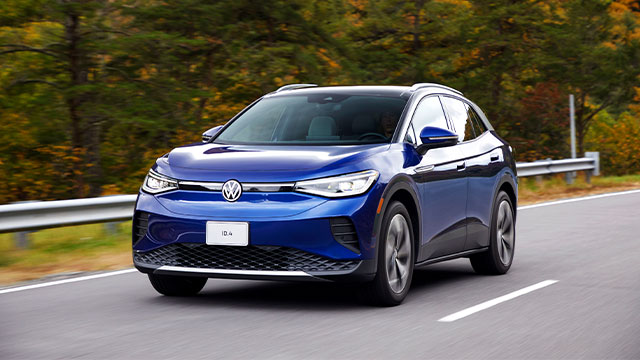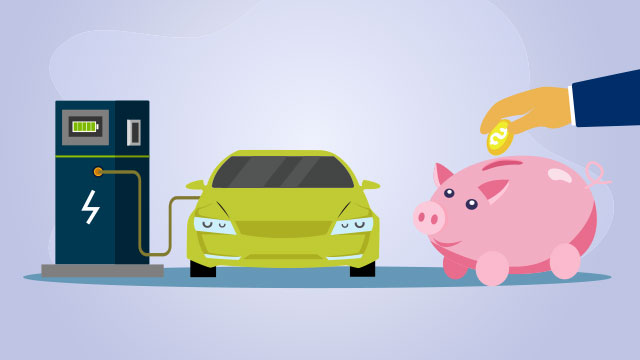Electric vehicles are bringing some of the biggest changes the auto industry has seen in years. Dozens more are expected to hit the market over the next few years. Many are making the switch to benefit from saving on fuel/maintenance, lowering daily transportation costs and helping to reduce air pollution.
Compared to a gas-powered car, you’ll have to consider how far you can travel before needing to recharge, how to “refuel” an EV, as well as how long it takes to charge and where to find a charging station. Our buying guide is here to give you the information you need to find the best EV for you!
An Electric Vehicle for Everyone:
Let's start with the basics. Electric Vehicles come in different shapes, sizes and with different energy sources;
 |
A BEV (Battery Electric Vehicle) is a traditional all-electric vehicle powered by a lithium ion rechargeable battery with no gasoline engine. Energy to run the vehicle comes from the battery pack which is recharged using grid electricity, either from a wall socket or a dedicated charging unit. The Hyundai Kona and Volkswagen ID.4 are BEVs. |
| A PHEV (Plug-In Hybrid Electric Vehicle) is the bridge between traditional gasoline vehicles and fully battery-powered electrics. PHEVs use both a gas combustion engine and a battery to power an electric motor. These vehicles are similar to hybrids but have a larger battery and electric motor. The Chrysler Pacifica Hybrid as well as the Jeep Wrangler 4xe are PHEVs. |  |
 |
An HEV (Hybrid Electric Vehicle) uses an electric motor to assist the gas-powered engine. You cannot charge an HEV, all the energy to power the engine comes from gasoline. The Toyota Camry Hybrid and Honda Insight are true hybrid vehicles. |
FCEVs (Fuel Cell Electric Vehicle) are powered by taking hydrogen into the fuel cell stack, mixing with oxygen from the air to create an electric current that powers a battery and electric motor. There’s limited availability of hydrogen fuel cell cars, and it will take time for FCEVs to expand availability.
Did Someone Say Deals and Discounts?
Help save the planet while saving money. The sticker price for an electric vehicle is typically higher than that of comparable models equipped with gasoline engines. However, there are a number of federal and state EV tax credits and other incentives that can lower the upfront cost of owning an EV allowing drivers to take advantage of fuel savings and reduced emissions. Federal tax credits are available up to $7,500 for PHEVs, FCEVs and EVs. States like NY, MA and CT offer their own set of rebates and tax deals.
Look for another money-saver; complimentary public charging. New EV models like the Volkswagen ID.4 throw in 3 years of free charging at Electrify America stations. Other vehicles like the Nissan Leaf and Hyundai Ioniq 5 have other charging deals.
What's Your Electric Vehicle Charging Plan?
Gas stations are useless for fully electric vehicles. Instead, you'll need to find a public charging station or plug in at home.
Level 1 Chargers refer to household three-prong outlets like those your computer or a desk lamp will use. Few electric car users charge their vehicles this way simply because of how long it takes. With this low-level charger, an EV can take anywhere from eight to more than 16 hours to reach a full charge.
Most people prefer level 2 charging capability, whether at home or at a public charging station. These chargers provide 240 volts of power and require an external device that plugs into a receptacle like your dryer outlet! With this faster charging level you can expect up to 20 to 30 miles of range added to the battery for every hour of charging. It takes up to eight hours to fully charge.
Also called a DC Fast Charger, the fastest-charging option is a Level 3 charger. You will only find Level 3 options in public charging stations that typically cost money to use. It usually takes about 40 minutes to get most cars to 80 percent.
 |
Most people don't need to charge their vehicle every day. These days EVs can travel 200 to even 500 miles before needing a charge! Charging times are also rough guidelines and estimates because electric cars also don’t charge at a constant rate. |
Plug In and Go The Distance With Lia
Now that you know more about EVs, stretch your dollar and check out our extensive inventory at any one of our 21 Lia locations. We are here to answer any questions you might have about our electric vehicle lineup or any other vehicle you’re interested in! Our friendly, knowledgeable and professional sales staff are here to assist with any and all of your automotive needs.

